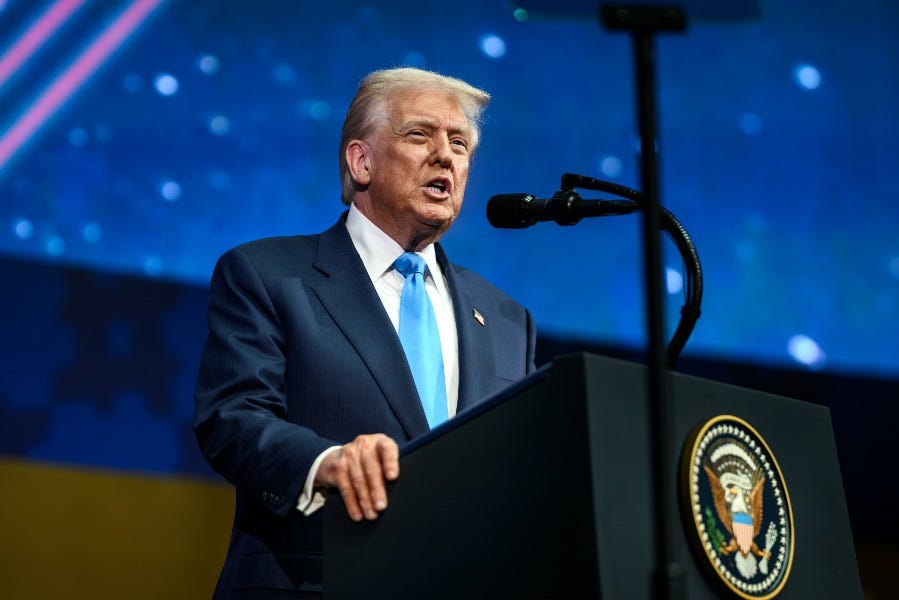Trump names Nigeria Country of Concern, floats military action
Description
U.S. President Donald Trump confirmed Sunday that he would consider potential military action to protect Nigeria’s embattled Christians.

He made the remark Nov. 2, days after announcing on social media that he was designating Nigeria, Africa’s most populous country, as a Country of Particular Concern due to grave violations of religious freedom.
Speaking to reporters Sunday aboard Air Force One, Trump was asked if the U.S. might send troops or deploy air strikes in Nigeria, after he said Nov. 1 that the U.S. could enter the country “guns-a-blazing” to confront Islamist militants.
“Could be, I mean, a lot of things — I envisage a lot of things,” he said.
He added: “They’re killing the Christians and killing them in very large numbers. We’re not going to allow that to happen.”
The CPC designation is likely to trigger a mixed response from Nigeria’s Catholic bishops. Some, including Makurdi’s Bishop Wilfred Anagbe, have publicly supported the measure, while others, such as Sokoto’s Bishop Matthew Hassan Kukah, have opposed it.
Nigeria has a population of around 239 million people, divided between Muslims, who mainly live in the north, and Christians, who largely live in the south. Muslims and Christians live side by side in the country’s Middle Belt region, known as a flashpoint for conflict.
According to the advocacy group Open Doors, more Christians are killed for their faith in Nigeria than anywhere else in the world. Sunni Islamists have also targeted the country’s Shia Muslim minority.
The U.S. Commission on International Religious Freedom accused Nigeria in its 2025 annual report, published in March, of “engaging in and tolerating systematic, ongoing, and egregious violations of religious freedom.”
The report recommended that Nigeria be designated as a CPC. The step triggers no automatic sanctions but requires the U.S. to negotiate an action plan with the government of the listed country.
The State Department was expected to unveil its next CPC list in December. But in an Oct. 31 post on his social media platform Truth Social, President Trump announced he was designating Nigeria as a CPC.
Citing figures that 3,100 out of the 4,476 Christians killed for their faith worldwide in 2023-24 were Nigerian, Trump said: “The United States cannot stand by while such atrocities are happening in Nigeria, and numerous other Countries. We stand ready, willing, and able to save our Great Christian population around the World!”
In a follow-up post Nov. 1, he threatened to cut all aid and assistance to Nigeria if it failed to prevent the killing of Christians. He said he had instructed the Department of Defense, rebranded by President Trump as the Department of War, to prepare for possible military action against Islamist terrorists and warned the Nigerian government it “better move fast.”
In a Nov. 1 statement, Nigeria’s President Bola Tinubu implicitly criticized the country’s CPC designation.
“The characterization of Nigeria as religiously intolerant does not reflect our national reality, nor does it take into consideration the consistent and sincere efforts of the government to safeguard freedom of religion and beliefs for all Nigerians,” said Tinubu, who has led the country since 2023.
In a statement the same day, Nigeria’s Ministry of Foreign Affairs insisted the government remained committed to tackling violent extremism.
“We mourn all the victims of violent extremism and salute our armed forces as they continue to fight against vicious but cowardly foes. The Federal Government of Nigeria will continue to defend all citizens, irrespective of race, creed, or religion,” it said.
Rep. Riley M. Moore (R-W.Va.) thanked President Trump Oct. 31 for his “decisive action” in naming Nigeria a CPC.
He said: “More than 7,000 Christians have been martyred this year alone — an average of 35 every day. This designation is a critical first step in holding the Nigerian government accountable for engaging in and tolerating particularly severe violations of religious freedom, including doing nothing to stop mass killings targeting Christians and upholding its blasphemy laws that disproportionately target Christians.”
Moore’s citation of blasphemy laws likely referred to the 12 northern Nigerian states that implement some form of Sharia law.
In a speech in Rome days before President Trump’s announcement, Nigerian Bishop Matthew Hassan Kukah opposed the CPC designation.
“Designating my country, Nigeria, a Country of Concern will only make our work in the area of dialogue among religious leaders in our country and elsewhere with the Nigerian state even harder. It will only increase tensions, sow doubt, open windows of suspicion and fear, and simply allow the criminals and perpetrators of violence to exploit,” he said.
Speaking to journalists at the same Oct. 21 event, Vatican Secretary of State Cardinal Pietro Parolin said he believed, based on local sources, that the situation in Nigeria was “not a religious conflict, but rather more a social one.”
“We should also recognize that many Muslims in Nigeria are themselves victims of this same intolerance. These are extremist groups that make no distinctions in pursuing their goals. They use violence against anyone they see as an opponent,” he commented.
The first Trump administration designated Nigeria as a CPC in December 2020. But the Biden administration removed the country from the list in November 2021, with no detailed public explanation for the decision.
There are around 35 million Catholics in Nigeria, the second-largest Catholic population in Africa after the Democratic Republic of the Congo’s.
Pope Leo XIV prayed in June for the victims of a massacre in Yelwata, in Nigeria’s Benue State, located in the Middle Belt.
He said: “Around 200 people were killed with extreme cruelty. The majority of those killed were internally displaced people who were being housed at a local Catholic mission.”
“I pray that security, justice and peace p





